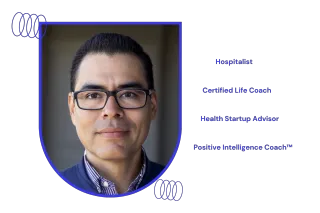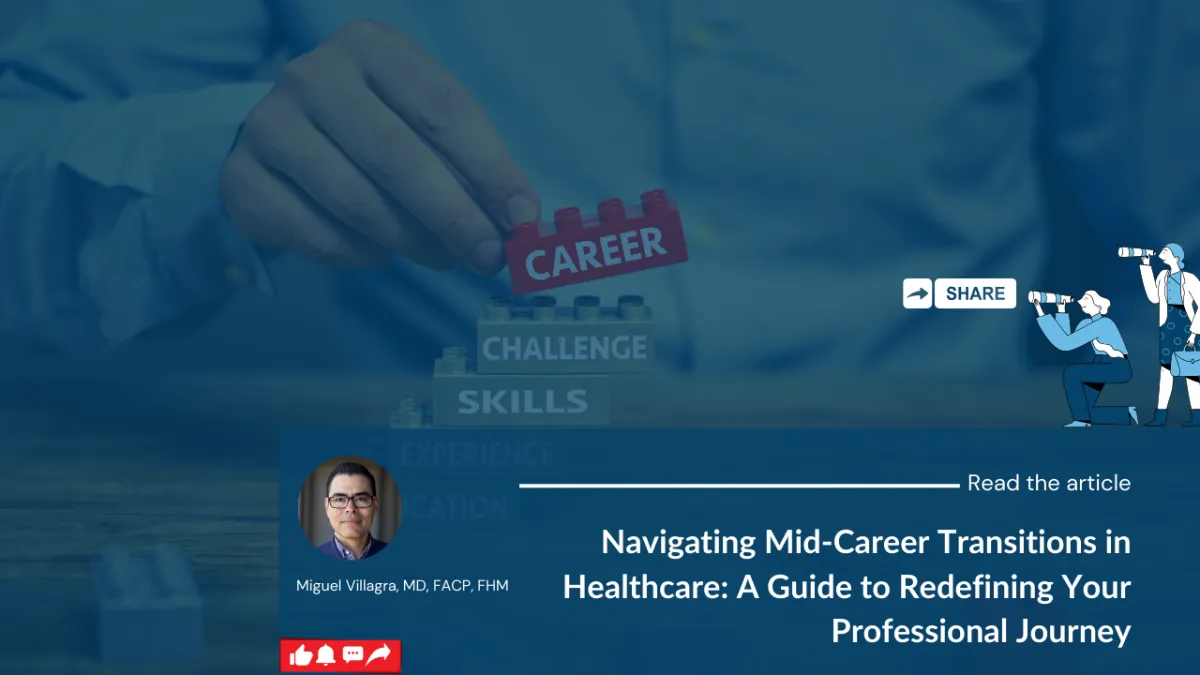Mid-career transitions mark a significant turning point in the lives of healthcare professionals. These shifts are often fueled by a desire for growth, better work-life balance, or a change in focus. While the idea of transitioning can be daunting, it’s also an exciting opportunity to align your career with your evolving passions, strengths, and goals.

The truth is, transitioning mid-career doesn’t mean starting from scratch. It’s about leveraging your experience, skills, and insights to explore new possibilities. With careful planning and actionable strategies, you can confidently take the next step in your professional journey.
In this comprehensive guide, we'll explore the essential steps and strategies for healthcare professionals considering a career transition. From evaluating your current position to creating an actionable plan, you'll discover how to navigate this transformative journey with confidence and purpose.
Why Mid-Career Transitions Matter in Healthcare
More Than a Change, It’s an Evolution
Healthcare professionals dedicate years to building their expertise, but as time passes, priorities can shift. Many find themselves yearning for more fulfillment, flexibility, or impact.
Common Motivations for Transitioning Mid-Career:
Personal Growth: Seeking fresh challenges that reignite passion for your work.
Improved Work-Life Balance: Reducing burnout by exploring roles with better flexibility.
Broader Impact: Stepping into positions that influence healthcare systems, policy, or education.
Key Insight:
Mid-career transitions aren’t about abandoning your previous work—they’re about building upon it to create a more meaningful and satisfying career path.
Understanding this perspective shift is crucial—it transforms what might feel like a daunting leap into an exciting evolution of your professional identity. When you view your transition through this lens, you'll find yourself better equipped to leverage your existing expertise while embracing new opportunities for growth.
Step 1: Assess Your Current Position and Goals
Clarity Comes from Reflection
Before deciding where to go, it’s important to evaluate where you are. Reflecting on your current role and long-term aspirations will provide the clarity needed to move forward.

Questions to Ask Yourself:
Am I fulfilled in my current role, or do I feel stagnant or burnt out?
What aspects of my work energize me? Which parts drain my enthusiasm?
Are there opportunities for growth in my current organization, or do I need a fresh start?
Common Scenarios for Transition:
Physicians: Moving into leadership, consulting, or public health advocacy roles.
Nurse Practitioners and Physician Assistants: Exploring new specialties, telemedicine, or teaching.
Allied Health Professionals: Transitioning into quality improvement, operational management, or innovation-focused roles.
Pro Tip:
Keep a journal to document your career values, frustrations, and accomplishments. Patterns in your reflections will help you identify what truly matters and guide your next steps.
Remember that self-reflection is an ongoing process. As you gain clarity about your career aspirations, you may find that your goals evolve. Stay open to these changes while maintaining focus on your core values and priorities.
Step 2: Explore New Opportunities in Healthcare
Healthcare’s Diversity is Your Strength
The healthcare industry offers a wealth of pathways for professionals eager to expand their horizons. Your clinical skills, problem-solving abilities, and leadership experience are highly transferable.

Popular Pathways for Mid-Career Professionals:
Leadership and Administration: Take on roles like department head, hospital administrator, or clinical director to drive change at the organizational level.
Healthcare Consulting: Use your expertise to advise organizations on improving patient care, streamlining operations, or integrating new technologies.
Teaching and Education: Share your knowledge by mentoring students, teaching at academic institutions, or leading professional development programs.
Telemedicine and Health Technology: Join the wave of virtual care and AI-driven solutions to improve access and efficiency in healthcare.
Public Health and Policy: Tackle systemic challenges by advocating for health equity, influencing policy, or leading community health initiatives.
Entrepreneurship: Start your own practice, consultancy, or health-focused business to align your work with your personal vision.
Example:
Dr. Emily, a pediatrician, transitioned into public health after recognizing her passion for tackling childhood obesity on a systemic level. Her clinical experience allowed her to lead impactful community programs focused on preventive care.
This real-world example demonstrates how transferable skills and clinical expertise can open doors to broader impact. By identifying opportunities that align with their passions, healthcare professionals can leverage their experience to create meaningful change beyond traditional patient care. The key is recognizing how your unique background can serve as a foundation for innovative solutions in healthcare.
Step 3: Create a Transition Plan
A Map for Success
A successful transition starts with a structured plan. Knowing the steps ahead will make the process manageable and less intimidating.

Actionable Steps to Transition:
Upskill and Educate:
Leadership roles may require an MBA, MHA, or leadership certification.
Health technology positions often call for training in telemedicine platforms or data analytics.
Public health careers may benefit from an MPH or policy experience.
Gain Experience Gradually:
Volunteer for leadership roles or join committees at your current organization.
Mentor junior staff or lead educational workshops.
Take on short-term projects to explore new fields without a full commitment.
Build Your Network:
Attend industry events, join professional associations, and connect with professionals in your desired field.
Use LinkedIn to expand your network and engage with thought leaders.
Seek Mentorship or Coaching:
Pro Tip:
Set clear, measurable goals for your transition, such as completing a certification within six months or scheduling informational interviews with three professionals in your target field.
Remember to stay flexible and adaptable as you work through your transition plan. What seems like a clear path today may evolve as you gain new insights and opportunities. The key is to maintain momentum while remaining open to adjusting your course when needed.
Step 4: Overcome Challenges and Embrace Growth
Turn Challenges into Opportunities
Mid-career transitions come with their share of obstacles, but a proactive mindset can turn these challenges into opportunities for growth.

Common Challenges and Solutions:
Fear of the Unknown:
Change can feel risky, but staying in an unfulfilling role carries risks too. Mitigate uncertainty by researching your options thoroughly and seeking mentorship.
Financial Concerns:
If your transition involves additional training or a temporary pay cut, plan your finances carefully. Look for scholarships or employer-funded programs to offset costs.
Impostor Syndrome:
Entering a new field may feel intimidating, but remember the value of your skills and experience. Celebrate small wins and seek feedback to build confidence.
Pro Tip:
Reframe your transition as an expansion, not a restart. Every skill and experience you’ve gained adds value to your new role.
The key is to maintain a growth mindset throughout your transition. Each new experience builds upon your foundation, making you a more well-rounded and adaptable healthcare professional. Your unique journey equips you with diverse perspectives that will prove invaluable in your new role.
Your Next Chapter Awaits
Craft a Career That Aligns With You
Mid-career transitions are an opportunity to redefine your professional journey. By reflecting on your goals, exploring new possibilities, and taking deliberate steps toward change, you can create a career that aligns with your evolving passions and priorities.
Ready to Navigate Your Mid-Career Transition With Confidence?
At A Doctor’s Journey, we specialize in helping healthcare professionals navigate pivotal career transitions. Whether you’re stepping into leadership, exploring non-clinical roles, or embracing emerging fields, our personalized coaching programs provide the clarity, tools, and support you need to succeed.
Take charge of your career today. Schedule your free consultation now.
Schedule Your Free Consultation

Remember that every challenge faced during your transition is an opportunity for learning and development. Your unique perspective and years of experience bring invaluable insights to your new role. Embrace this journey with confidence, knowing that your past achievements have prepared you for this next exciting chapter.
Custom HTML/CSS/JAVASCRIPT


























